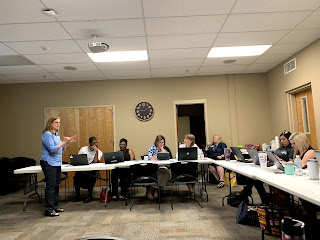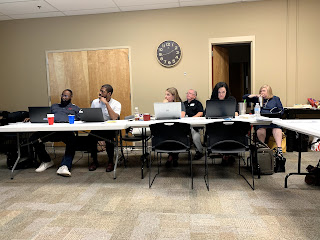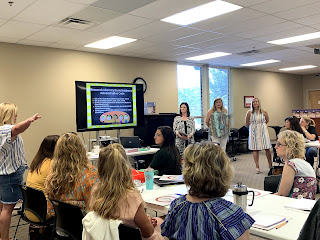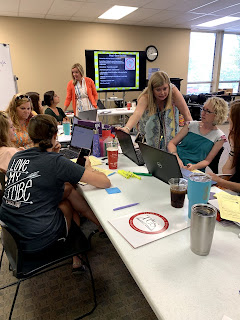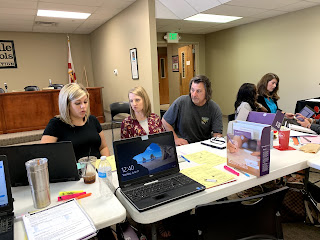What an amazing time we have had teaching, learning, and leading over the past years in Trussville City Schools. It has truly been an honor and our pleasure. We know that the dedicated leaders and teachers in our district will continue to grow, learn, and lead. May God continuously guide and bless you as you shape the future for our students and our country.
Beth and Jennifer
The goal of this blog is to inform and update educators on relevant and important issues regarding teaching and learning.
Engaging All Learners

Studio Day April 2019
Thursday, June 27, 2019
Thanks for the Memories
Scantron Analytics Training
TCS administrators and counselors learned about Scantron Analytics today. This application that allows the user to carefully look at student and school data will be used during the 19-20 school year. All school administrators, counselors, and central office staff will have access to the application. Data will provide information about enrollment, attendance, grades, RtI, early warning, graduation, discipline, student watch list, and student profiles.
Wednesday, June 26, 2019
Quotable Quote
“Wherever you turn, you can find someone who
needs you. Even if it is a little thing, do something for which there is no pay
but the privilege of doing it. Remember, you don’t live in the world all of
your own.”
—Albert Schweitzer
(1875-1965)Philosopher, Physician, Nobel Peace Prize Winner
Wednesday, June 12, 2019
Dyslexia Training for TCS Teachers
The three elementary schools in TCS were chosen to participate in a state sponsored pilot program to train teachers to use specific materials for supporting struggling readers. Master teacher Arlene Sonday created the Sonday System Reading Program based upon Orton-Gillingham methodology to teach reading from beginning letter and sound recognition through most phonograms. Selected teachers in grades K-6 will use the Sonday System for Tier II and Tier III intervention during the 19-20 school year.
The first day of training was facilitated by reading coaches Jenni Peters, Edra Perry, and Kelly McGough, and reading specialist Fran Box on June 11. The day-long experience introduced teachers to the Sonday System program and materials, as well as an overview of dyslexia and Alabama law related to dyslexia. Feedback from the teachers was exceptionally positive.
Comments from teachers' feedback:
The first day of training was facilitated by reading coaches Jenni Peters, Edra Perry, and Kelly McGough, and reading specialist Fran Box on June 11. The day-long experience introduced teachers to the Sonday System program and materials, as well as an overview of dyslexia and Alabama law related to dyslexia. Feedback from the teachers was exceptionally positive.
Comments from teachers' feedback:
- Great job! All presenters did an excellent job of teaching us!
- Today I learned that dyslexia is a challenge, not a disability. It's an interference.
- I love having everything in one box that I can use to help students become better readers.
- Today I learned a great new program that is easy to follow, great to help Tier II intervention, and a very good resource to incorporate a multisensory approach to teaching phonics, fluency, comprehension, and spelling.
- Today I learned so much about procedures and expectations to enhance the multisensory learning of all my students really, but especially the strugglers.
- I feel like I have a better grasp on the program and am excited about seeing the results it will bring to our babies that need it.
- I learned that 1 in every 5 students has dyslexia. You need to repeat things 3 times for them to be in long term memory.
- As a classroom teacher I am a dyslexia interventionist.
Tuesday, June 4, 2019
Quotable Quote
To give real service you must add something which cannot be bought or measured with money, and that is sincerity and integrity.
Douglas Adams
Elementary Teachers Revise and Review Curriculum Guides
Elementary teachers met to work on revisions to their math curriculum guides this morning. This work has been going on since mid May. This afternoon, additional math teachers came in to hear and see the new revisions, giving their stamps of approval. Math coaches who are facilitating the work are Stephanie Rosetta and Monica Bramlett.
LeadChange: Daily Gratitude
I read a timely article about gratitude this morning from LeadChange. The highlights of the article are:
Gratitude is a conscious and willful action. You have to be aware of what you have in life for which you should be grateful. Once you have identified all your blessings, then remember and renew your gratitude for each one daily. Thankfulness is the sun in the morning fog—gratitude will burn away any doubts you have about your purpose in life.
To read the entire article, click here.
- Gratitude is a conscious choice. It doesn't just happen.
- Gratitude not only makes us feel happier, it is a significant cause of positive outcomes.
- Gratitude makes us better leaders.
- Gratitude motivates us to work harder.
- Gratitude drives your purpose.
Gratitude is a conscious and willful action. You have to be aware of what you have in life for which you should be grateful. Once you have identified all your blessings, then remember and renew your gratitude for each one daily. Thankfulness is the sun in the morning fog—gratitude will burn away any doubts you have about your purpose in life.
To read the entire article, click here.
Showing someone gratitude is the same as showing them respect; this is highly regarded in business and in any relationship.
Monday, June 3, 2019
Learning Forward: What Makes Curriculum Work
Trussville City Schools has a history of being committed to comprehensive, high-quality curriculum. The Knowledge Matters Campaign, a coalition of education leaders who encourage schools to focus on developing students' foundation of content knowledge, toured elementary schools for the purpose of discovering what kinds of professional learning teachers found most helpful in successfully implementing a high-quality, content-rich curriculum.
Here are four lessons for administrators and teachers:
Embrace a “we’re-in-this-together” school leadership stance.
Teachers and coaches stressed the vital role of school leaders in driving robust implementation. Most important to staff was the passion that leaders conveyed about the learning the school was undertaking. Principals in the schools they visited were constantly in and out of classrooms, as much to learn and grow themselves as to observe how teachers were doing. Teachers expressed their deep appreciation for the presence in their classroom of leader learners, rather than leader evaluators.
Tend to the hearts and minds of teachers by sharing the philosophy and research behind the new curriculum.
It is monumentally important to ground teachers in the research behind new shifts and to build authentic faculty buy-in and enthusiasm, based on a shared understanding of the philosophical underpinnings and research base for the curriculum.
Make professional learning curriculum- specific.
What characterizes the professional learning opportunities described by teachers and coaches in the schools they visited is that they’re messy - experiential. The process is similar to the Japanese concept of lesson study. Grade-level and cross grade-level teams are rolling up their sleeves and working together, engaging in the content of what they’re teaching in the classroom and figuring out the best way to deliver it, leaning heavily on the curriculum.
Invest in your teachers through yearlong professional learning systems.
Significant time is necessary for ongoing, sustained professional learning. Examples included time for teachers to plan lessons together with their grade level team every day, early release time for districtwide collaboration, faculty book studies, and multiple days for coaching to implement new curriculum,
Successful implementation requires significant resources. But there is a payoff for such an investment: Researchers report that teachers who participated in sustained, discipline- specific professional learning that dealt concretely with what they were teaching in the classroom — professional learning that averaged 49 hours across nine separate studies — saw student achievement increases of about 21 percentile points.
This definitely makes me think about our Elementary Math Teachers Cohort and the roll out and implementation of Lucy Calkins Units of Reading. Principals, assistant principals, and coaches have embraced and studied these new curricula, along with teachers. And the most significant part of EMT (Elementary Math Teachers Cohort) is the study of the research behind student learning and understanding. Teachers regularly plan and collaborate in grade level meetings and across the district. This targeted, curriculum-specific professional learning continues to support the learning of teachers and students.
To read the entire article, click here.
Dr. Jennifer Cardwell Receives Award
Dr. Jennifer Cardwell, Assistant Director of Curriculum and Instruction Program Coordinator of Secondary Programs for Trussville City Schools, was awarded ACCESS Administrator of the Year Award from Dr. Kevin Besnoy, Director of ACCESS Virtual Learning, at an awards ceremony at the Bryant Conference Center on the University of Alabama campus Friday. Dr. Cardwell is the recipient of both the University of Alabama's ACCESS Administrator of the Year, as well as the State's ACCESS Administrator of the Year.
Subscribe to:
Comments (Atom)

